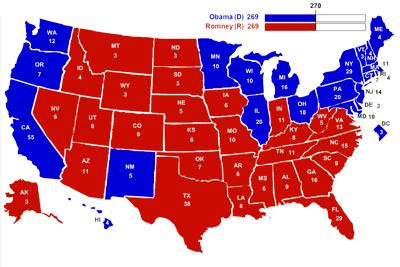
An electoral tie in which neither candidate gets to 270 votes would leave the election in the hands of the House of Representatives. (AP)
On Tuesday, Nov. 6, America will vote on who they want as president for the next four years, and then this whole election season should all be over, hopefully.
Several media outlets have predicted that a tie in the electoral vote would be possible. A tie would lead to media dream scenarios that end up with a Mitt Romney- Joe Biden ticket because of how the process would then work. This would never happen.
The theory is that in an electoral tie, 269-269, the presidential election would then be decided by the state delegations of the House of Representatives, and the vice presidential election would be decided by the Senate. Because Republicans have a large advantage in the House, and Democrats are likely to keep their advantage in the Senate, some in the media have fantasized about the House picking President Romney, and the Senate picking Vice President Biden. For several reasons, this outcome is exceedingly unlikely.
Firstly, while an electoral tie is theoretically possible the states would have to come down in a very odd manner. The most likely of the ties would be Romney winning Florida, Virginia, North Carolina, Iowa, Nevada and Colorado, and Barack Obama winning Wisconsin, Michigan, Ohio, Pennsylvania, New Mexico and New Hampshire. Given that Obama has had a pretty consistent lead in Nevada, and Romney is leading in New Hampshire, this doesn’t seem likely. For the states to break down like that would be very strange, as states that tend to have a slight Democratic lean like Iowa would have to break to Romney while states with a slight Republican lean like Ohio would have to break to Obama.
There is a metric called the Cook Partisan Voting Index (CPVI) which measures the partisanship of states by their voting history in presidential elections. A state with a D+4 CPVI for example would vote on average 4 percent more Democratic than the country as a whole. If a Republican won nationwide with 55 percent of the vote, he would expect to win that D+4 state with 51 percent of the vote.
It’s this analysis which should show the above “tie” scenario to be unlikely. Ohio has a CPVI of R+1, whereas Iowa and Nevada have a CPVI of D+1. Therefore, while it is possible for Romney to win Iowa and Nevada, it would be pretty strange for him not to also win Ohio when he does so. The measure is susceptible to demographic changes or individual quirks in each election as well, so that could change it. Perhaps Romney is just too elitist for the blue collar Republicans of Ohio, and maybe that could blunt the slight Republican lean and give the state to Obama. However, Nevada’s increasing Hispanic population has made the state less viable for Republican candidates, not more.
Further, even if there is an electoral tie, the two houses of Congress splitting their tickets would be very unlikely. Without question, the House would pretty solidly vote for Romney. But that decision is made first, and the Senate would have to wonder if splitting the ticket would be a good idea or if Biden would even want to do it. I would think that the Senate treat the election of a vice president more like a cabinet appointment, and vote overwhelmingly for the candidate chosen by the President, not voting on party lines.
Ultimately, all of this speculation by the media about this prospect amounts to exactly that – speculation. It’s a lot like the speculation during the primary about the possibility of a brokered convention: it’s a fun exercise for the media to think about, but doesn’t have any real chance of happening.
Keene is a junior majoring in political science, economics and public policy.








